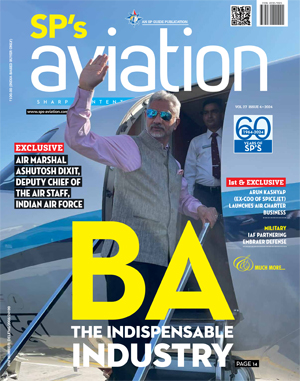INDIAN ARMED FORCES CHIEFS ON
OUR RELENTLESS AND FOCUSED PUBLISHING EFFORTS

SP Guide Publications puts forth a well compiled articulation of issues, pursuits and accomplishments of the Indian Army, over the years

I am confident that SP Guide Publications would continue to inform, inspire and influence.

My compliments to SP Guide Publications for informative and credible reportage on contemporary aerospace issues over the past six decades.
On a Path Towards Democracy

The aid provided to the rebel forces could rid Libya of Colonel Gaddafi and his long abhorrently dictatorial rule, a sentiment which is increasingly finding global acceptance. But once achieved, would it also engulf Libya in the wafting fragrance of a flourishing democracy?
The democratic fragrance of ‘Jasmine Revolution’ having engulfed both its western and eastern borders, how could ‘sandwiched’ Libya, also reeling under the four decade despotic rule of Gaddafi, remain unaffected? But unlike the largely peaceful protests which resulted in the ouster of Tunisian President Zine El Abidine and the Egyptian President Hosni Mubarak, the street protests in Libya quickly turned into an armed struggle owing to the highhanded treatment meted out by the Libyan security forces.
Though Libya, one of the largest oil producers of Africa gained independence from colonial rule as Kingdom of Libya in 1951, it is being ruled from 1969 till date by Colonel Muammar al Gaddafi who rose to power in a military coup. Gaddafi is one of the longest serving rulers in history. After abolishing the monarchy of King Idris, he created a new regime based on Arab nationalism and a welfare state, combining various roots of his political philosophy in his personal manifesto called “The Green Book”. In 1977, he proclaimed that Libya was changing its form of government from a republic to a ‘Jamahiriya’, meaning government by the masses. But in reality, the oneman rule has continued till the present day. And as it usually happens, his autocratic iron-fisted rule resulted in suppression of the masses, large-scale corruption and his family amassing billions of dollars worth of illgotten public wealth.
The protests and confrontations began in earnest on February 15 in Benghazi which was brutally suppressed by the police. The protests quickly spread like wildfire in other towns inviting the wrath of the security forces. By February 20, more than 200 people had been killed in Benghazi alone. Next day, the Libyan Air Force aircraft attacked civilian protesters in Tripoli itself. The Libyan Government shut down the Internet and mobile phone network to hide the brutal violence. Gaddafi had declared war against his own people forcing some of his own Ministers and high officials to either step down or distance themselves from him declaring his regime to be illegitimate. But when Gaddafi roared to quash his opposition like rats and cockroaches, the international community woke up to the possible reality of an impending genocide. In 2005, the United Nations approved a new doctrine called the “responsibility to protect”, nicknamed R2P, declaring that world powers have the right and obligation to intervene when a dictator devours his people. The UN Security Council’s Resolution 1973 authorising military intervention to prevent casualties to civilian population in Libya is like putting teeth into the fledging concept. At the time of passing the UNSC resolution, BRIC countries i.e. Brazil, Russia, India, China and Germany abstained, generally stressing reasons such as lack of full information, unintended consequences of military action and the need to address the problem through a political process rather than through military intervention. However, abstention tantamounted to passive negation of the resolution which revolved around the issues of infringement of a country’s sovereignty in solving its internal problems. Russian Prime Minister Putin went to the extent of calling the coalition air strikes to ensure no fly zone (NFZ) over Libya, interference akin to medieval crusades, officially, the remark was withdrawn later on. But the other world powers spearheaded by France and UK and supported by Obama’s Administration were unanimous for the need of military intervention to avert looming mass-scale annihilation of civilian population by Gaddafi’s forces.
A senior White House aide suggested that while critical national security and national interest reasons must have played a crucial part, it were the humanitarian arguments which proved to be decisive for President Obama to support the UN resolution for military intervention. “The President was well aware of the risks of military action, but he also feared the cost of inaction,” the official said. While agreeing in principle with some Congressional critics’ who complain that Obama should have consulted Congress more thoroughly, the New York Times noted that the time factor was too crucial for the President to indulge in political niceties. It went on to suggest that, as it is, the intervention was almost too late because forces loyal to Gaddafi were already in Benghazi and any delay would have resulted in a major bloodbath and perhaps the collapse of the rebel government. The enforcement of the NFZ, therefore, couldn’t have come sooner. With Gaddafi’s air defence system and air force effectively out of the equation, and a maritime embargo in place, the ground situation was not only retrieved but it also enabled rebel forces’ westward offensive push.





